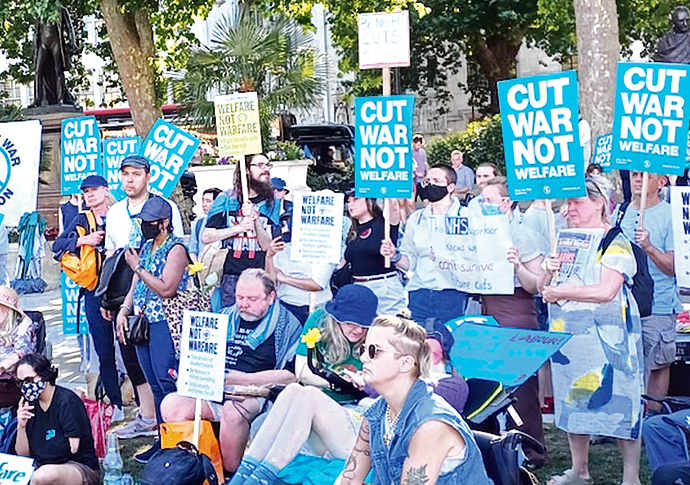‘This whole thing has been terrifying’: Anger over government's Welfare Bill chaos
Last minute changes to policy still lets down disabled, say campaigners
Thursday, 3rd July 2025 — By Caitlin Maskell and Dan Carrier

Protesters at Westminster this week
CUTTING payments to vulnerable people is an act of cruelty – and the government’s last-minute climbdown, triggered by a backbench rebellion over benefit reforms, does little to fix the damage, Camden disability rights groups warned yesterday (Wednesday).
“This entire process has been absolutely terrifying. It has felt like a direct assault on disabled people,” said Colin Brummage, CEO of Camden Disability Action (CDA).
The Labour government narrowly passed its controversial welfare Bill on Tuesday night after a last minute U-turn on key disability benefit reforms.
Facing the biggest rebellion in Sir Keir Starmer’s leadership, ministers scrapped proposed cuts to Personal Independence Payment (PIP) delaying changes until 2026.
Cuts to Universal Credit for future claimants remain.
The CDA, based in the Greenwood Centre in Kentish Town, said whilst the concessions were welcomed, they were disappointed the Bill was not scrapped entirely.
Mr Brummage said: “We’re obviously still really angry and concerned that the Bill has gone through and the other elements that form part of these measures including that more disabled people will be forced into a position of looking for a job within a labour market that has never proven to acknowledge, accept or be tolerant of people with different minds and bodies.
“We’re also sceptical about the promises of co-production around the reform reviews to PIP eligibility. Camden Disability Action has never seen co-production done properly and so we’re sceptical as to whether real power will be put into disabled people’s hands and whether disabled people’s views will really be taken into account in the process of reviewing the PIP eligibility.”
Mr Brummage added: “Many of our members have expressed that they feel betrayed by the new government as they were hoping for change.
“Engaging with the Greenwood Centre offers the PM a real opportunity to understand the complexities of disabled peoples employment disadvantage.
“We’re disappointed Keir Starmer didn’t come to our Welfare to Work event and disappointed there was no proactivity to try to seek us out and learn from our lived experiences to really shape welfare reform.”
Winvisible, also based in Kentish Town, is a women’s disability rights group who have campaigned for years and helped people fight for their rights.
Co-ordinator Claire Glasman said the government plans to allow current claimants to continue to receive Personal Independence Payments but not new claimants was divisive.
She said: “It is just really cruel. We will carry on campaigning – we do not know what will happen with the next stage but disability organisations should not be complicit in helping the government make cuts.
“They say they will now consult but we know from the current Green Paper they do not respect our views – they put forward legislation before the Green Paper was finished and that has damaged their credibility when it comes to consulting people. Disability groups should not be involved in working out how to cut PIP.”
The government had hoped to find savings of £5bn by cutting PIP.
The watered down Bill passed its second reading by 335 votes to 260.
Ms Glasman added: “We have been pushing for better benefit rights for many years. We have campaigned to change a system that already makes it very hard to claim disability benefits, and against the use of private companies in making assessments. At the moment, around half of the people who apply for PIP are dismissed – and it is the same for Universal Credit.”
Tulip Siddiq, MP for Hampstead and Highgate, said: “In recent weeks I have met with many disabled constituents to hear their experiences. It is clear that the welfare system urgently needs a reset so that vulnerable people get the best support available to them.
“The changes being proposed will preserve the social security system for those who need it by putting it on a sustainable footing. Most importantly, disabled people and the organisations that represent them, will co-produce the review of PIP assessment, ensuring their voices are at the heart of the conversation.”